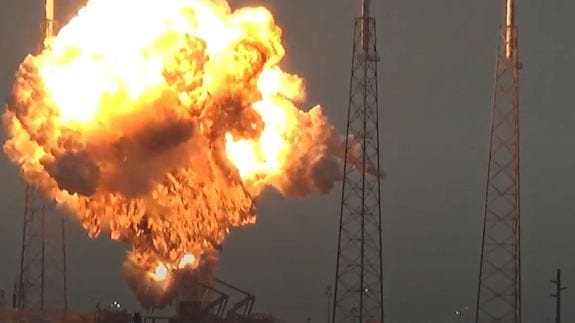There was some bit of bad news for internet accessibility in Africa Yesterday (Thursday, September 1, 2016) as the rocket that was supposed to launch a Facebook Internet Satellite that was targeted at delivering affordable high speed internet to users in Africa and other regions exploded at the NASA launch site in Florida taking the payload with it.
The SpaceX Falcon 9 rocket was billed to launch the Facebook Internet Satellite to space on Saturday, September 3, 2016, but went up in flames during a routine test at its Cape Canaveral launch pad on Thursday morning.
The CEO of SpaceX Elon Musk tweeted that the explosion occurred during “propellant fill operation” and that it “Originated around upper stage oxygen tank”. The tweet also said the cause of the explosion was still unknown.
Loss of Falcon vehicle today during propellant fill operation. Originated around upper stage oxygen tank. Cause still unknown. More soon.
— Elon Musk (@elonmusk) September 1, 2016
In its official statement about the mishap, SpaceX said
“At approximately 9:07am ET (1307 GMT), during a standard pre-launch static fire test for the Amos-6 mission, there was an anomaly at SpaceX’s Cape Canaveral Space Launch Complex 40 resulting in loss of the vehicle,”
Thankfully, there were no injuries as a result of the explosion, but the destruction of the satellite left the CEO of Facebook Mark Zuckerberg, who was on a tour of Africa when the news broke, “deeply disappointed”.
The Facebook Internet Satellite, Christened the Amos 6 satellite was built by Israeli company SpaceCom and was part of a collaboration between Facebook and French Satellite Operator, Eutelsat.
The collaboration was aimed at delivering fast and affordable internet to most of Sub-Saharan Africa.
For now, it is not clear were this explosion leaves the ambition by Facebook to beam internet via satellite to people in Africa.
However, Facebook’s CEO did hint that the company is still committed to the broader objective of connecting everyone. Whether the Facebook Internet satellite solution will remain part of the mix is not clear at this time. We will probably know more in the coming days, weeks, or months.






